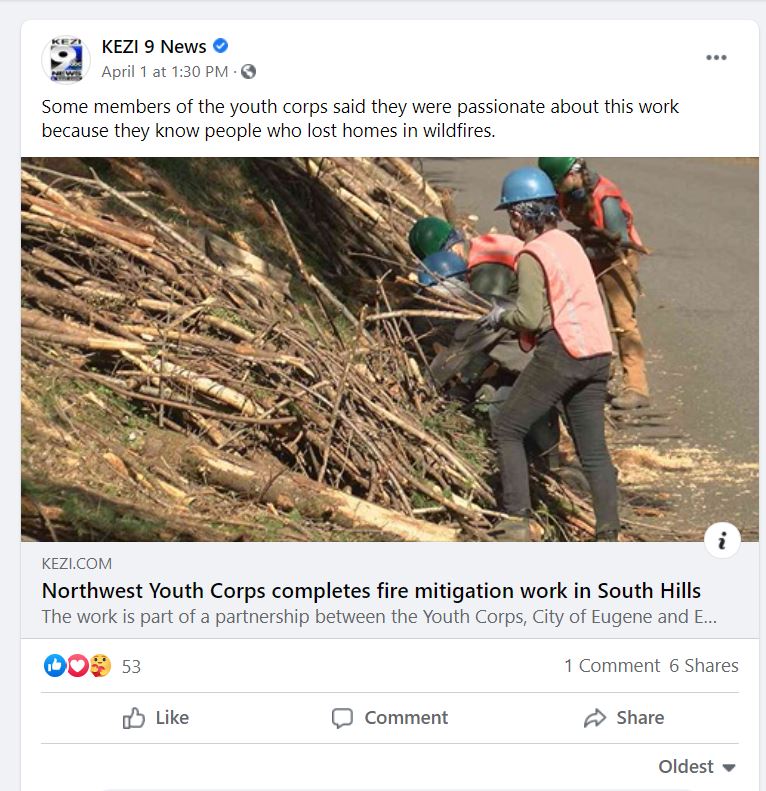Sen. Wyden: NW Youth Corps shows us how to ‘Build back better’
4 min read
Sen. Ron Wyden visited Ian Appow's NWYC crews and announced legislation to create a 21st Century CCC.
Ian Appow has been reducing dangerous wildfire fuels around Eugene for the past two fire seasons.
Ian Appow: Everyone’s understanding of how to best handle this is different and that has to be respected and encouraged and shepherded along here. It’s part of the process, because it’s going to take a culture shift. It’s not going to take one project that’s a month and a half, two months long and all our problems are gone. There’s adaptive change that we have to do, and this is how you do it.
John Q.: Ian and partners go through five steps when setting up fuel reduction projects:
Step One: Identify the properties.
Two: Assess the hazards.
Three: Meet with the landowner who decides what to do.
Four: Coordinate the crews.
Ian and his Northwest Youth Corps teams are halfway through Step five: Get stuff done.
Thank you for supporting
local citizen journalism
Ian Appow: The Northwest Youth Corps is bringing in people, people from North Carolina, Texas, Washington, Idaho, New Jersey, Pennsylvania, and they’re in small groups of five or six because of COVID and they’re camping outdoors and, they’re remote and sticking together as a pod and their experience, I think is just so interesting. And you know, I think to them, a lot of times it doesn’t seem like a big deal. I’ve seen interactions with some, from the public coming up to them, talking to them about what they’re doing and learning about it. And, it totally shifts the mentality in a matter of milliseconds. It’s just amazing how quickly the relationship and the work has translated into these young peoples’ lives so quickly, and then how passionate they are. Seeing these young adults step up, that aren’t even from here, and do this work, it’s incredible.
John Q.: The teams were visited at a work site recently by United States Senator Ron Wyden.
Sen. Ron Wyden: Eighty years ago, the Civilian Conservation Corps was out there planting trees and fighting fire and putting beautiful trails out there for everybody to enjoy. And you guys are an updated picture of what was done 80 years ago. You’re reducing fire risk, you’re planting trees. You’re doing the kinds of things that people did 80 years ago. So I’ve introduced legislation to basically create, all over the country, these Youth Corps projects like yours. And I think they’re going to make a huge difference both in terms of helping local economies, helping ecosystems, and giving particularly young people a shot at the future. It’s called the 21st Century Civilian Conservation Corps. And we’re going to have these kinds of projects all over the country because you’ve been hearing during this Congress, ‘You want to build back better’? I think you’re a big part of building back better.
Ian Appow: The visit with Senator Wyden was at a location where the residents had volunteered hours, they’d given funding to help with their own fuels mitigation work, and they had all these stacks and stacks and stacks, and we came through with a chipper and help them load up containers. We just gave them some extra hours and extra bodies and attention to it, because, talking about fire is what we do.
For people, when they’re not ready for the conversation, it can be very staggering and it’s like almost harsh, saying, ‘You have higher dues’ or ‘You’re being fined’ or someone coming in clearing, or, ‘Your house is already gone through a fire.’
John Q.: Ian said those discussions are important as we come together as a community to prepare for the next big wildfire.
Ian Appow: You can see this and it’s going to always need work. You know, these are always a work in progress. We have a shorter window of time, but we have more partners. We have more investment. We have more organizational experience. And what does it look like this time around? It’s looking really good.
John Q.: And as that work wraps up, the cycle begins anew with step one, identify properties.
The Eugene Wildfire Preparedness Coalition sent out a bright orange postcard this week offering a free wildfire risk assessment. Tom Peck says he has been overwhelmed by the response, answering phone calls nonstop. Tom says the high demand shows the need for a citizen-based training program. In fact, Tom said, he’s collaborating with Katie Gibble from Ashland Fire and Amanda Rau from OSU Extension on just such a program: Wildfire Risk Assessment training. They expect to train the first 20 citizens this year. In the meantime, Tom apologizes for the delay in returning your phone calls, and Eugene neighborhood residents interested in a free home assessment should email Eug.Fire.Prep.Coalition@gmail.com or sign up at https://tinyurl.com/3fctcwxv.




